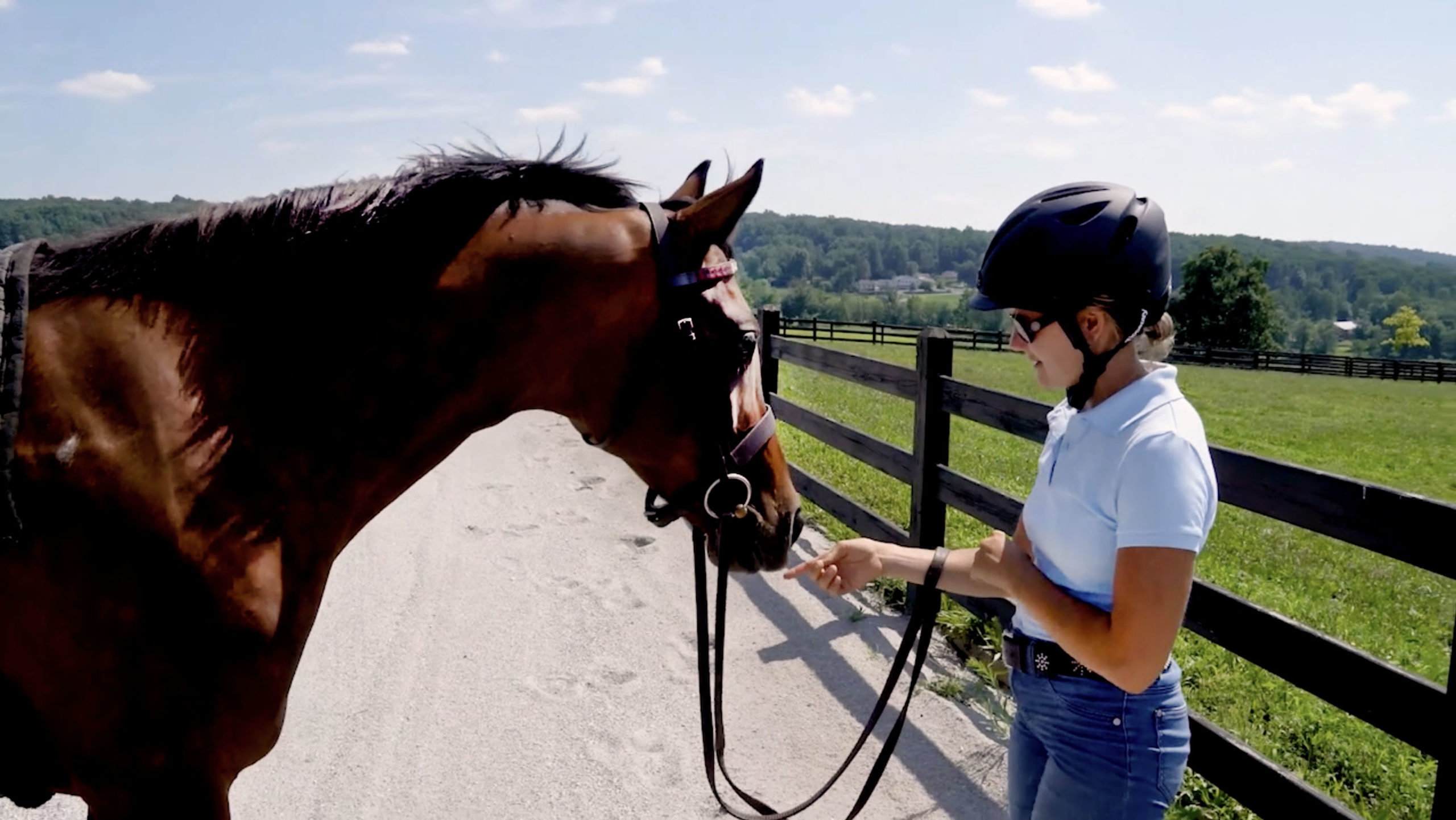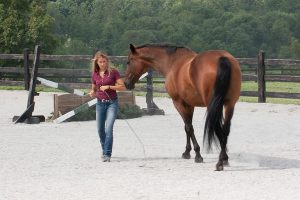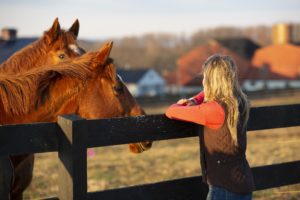Riding is unique to any other activity we do. In riding, we partner with a large and powerful being – the horse.
We need to communicate with the horse while sitting atop them, maintaining our balance (hopefully) as they move. In riding, we face our fear, because we face a real risk. We could fall. We could be hurt.
When we ride, we find confidence in ourselves and trust in the horse. And the process of doing this, the challenge of doing this, is what makes riding so special.
In this way, riding is more than the physical challenge of just staying on and moving in sync with the horse. It is also a mental challenge as we choose how far to push ourselves.
And it is a relational challenge as we seek to understand and communicate with the horse.
In this video, we’ll talk about how riding is often taught only considering the physical challenge – how do you sit, how do you hold the reins, etc, while neglecting the other elements of great riding.
HOW you learn matters, so watch this video to discover a progressive and complete path to learning riding.
PS Heads up! New FREE workshop begins October 11!
Through this workshop, I will cover the 3 BIG myths that are likely holding you back in your riding and how to separate fact from fiction!
I will also be hosting live video clinics, where you can send in your video for the opportunity of live feedback.
Want in? Click Here to reserve your spot!
PPS Hear from some of our Balanced Riding Course Alumni as they share their journey with horses, their highlights and their challenges – watch now!














39 Responses
Some bad advice I was given as a child learning to ride was to “show the horse who’s boss,” which came from some well-meaning family members who had very little horse experience. While having your horse respect you is important, riding is more about communication and partnership rather than trying to dominate your mount. This is one aspect of riding that I wish I had been taught from the beginning.
Hi Ann,
Developing a partnership and mutual trust with your horse is at the core of good riding. This sentiment is actually one of the most commonly taught myths in conventional riding that we will discuss in our upcoming new Online Riding Workshop, starting October 11th. Hope to see you there!
Yorke
I’m a re-rider! After 40 years away from horses, I began riding again this spring and had the startling experience of executing a flying dismount (managing to grab the pommel and set myself on my feet) the first time in the ring I asked my lesson horse to canter. I hadn’t realized, before checking into Horse Class, that I was putting myself and my horse completely out of balance by leaning forward to ask for the canter (something that my childhood push-button pony and my childhood body were completely forgiving of). It is great to be back in the saddle again and to be learning what to do and why to stay there!
Nancy,
So excited to hear you are enjoying being back in the saddle! I am glad you are okay after that shocking start. Finding better balance in your own body so that you can help your horse find better balance with you is so essential for you both to feel more confident, relaxed, and connected. Hope to see you in our new workshop!
Yorke
I learnt riding as a kid at a riding school, English saddle; never got the grip I should have had. My husband, and later my kids too, started off learning to ride bareback – and they all had better grip and balance than I ever had
Anna,
It is amazing how intuitive riding is when we’re so young. Later, doubts and feeling the need to stay in control can sometimes affect our ability to deeply connect with our horse and rhythm under saddle. Hope to see you in our new workshop!
Yorke
I wish I had known about a lot of ground work with breathing etc., I’ve just lost my old boy of 26 to bowel cancer, my daughter has lost interest in the horse we bought her, now I want to ride her, after a year of teaching her manners, I do love her and I think she cares for me as she talks to me all the time. I’m real nervous about riding her as she is 8 yrs old and I’m too old, she has two habits I’ve noticed with other riders, go forward and back ups with a little buck, once started she’s fine, she does most things for me so I’m hoping she won’t buck with me.
Arvi,
I am so sorry for your loss.
It’s never too late to get back in the saddle, even if starting with a young horse! Beginning with ground work and small, steady progress is the best way to develop the foundation of your communication and connection together. Each day is a new day to start again, start different. And each horse tends to behave differently with different riders. You may find those habits with other riders do not pose a problem for you and her. Take things progressively and enjoy the journey together! Hope to see you in our new workshop.
Yorke
I wish that I had been given the information of how a horse learns with pressure and release. Not until I was well into my 40’s (I’m now 67) that this fundamental knowledge of communication with my partner was taught to me that I really was able to be a fair, understanding, and patient, partner/leader /friend. It makes me look back on my past partners and how I could have had a greater relationship with each one of them. They were all amazing but I know in my heart that it could have been so much more.
What time are your online classes as I work during the day and I actually don’t have a horse yet. I love all your videos.
Hi Kari, our courses are pre-recorded plus you watch recordings of any live classes, so no need to be online at any specific time! We would love to have you join us!
the one thing I wished I’d learn’t was to breathe and relax! Release any tension before doing anything with my horse. Decades later, I learn’t this, and it is so simple, yet so important.
The importance and benefits of ground work beyond lunging the horse. Benefits that will relate to riding as well as communication and developing a relationship with my horse.
yes! groundwork is very important!
I wish I would have learned the emergency stop sooner. No train ever taught me that. A friend taught me about the one rein stop. I instead would panic in bad situations and pull on the reins and knock the horse off balance which meant sometimes the horse would rear. Once I learned the one rein, all that stopped.
DressageOwl,
It is a great safety trick to know for any rider. Glad to hear it has worked for you! Hope to see you in our new workshop.
Yorke
One thing i wish id known was that theres no need to be dominant and controlling, it is safer when dialogue is more open and flexible as the horse is being cognitive rather that reactive.
I wish I had learned the basics of dressage first. Regardless of discipline I think this is a good starting point. Starting at almost 40 in a hunter/jumper barn the assumption was everyones goal was to ultimately jump. I didn’t know what I didn’t know. Now concentrating on seat / balance / breath / connection etc. I will be better prepared if I ever do want to jump around a course.
Christne,
It is amazing the difference some attention to our breath, balance, and connection can make in our riding goals! Hope to see you in our new workshop.
Yorke
One thing I wish someone had taught me when I was young and just started riding, but as an adult I now understand, is that the horse isn’t trying to be my buddy. Rather, he’s looking to me for leadership and protection (as in a herd). I need to be kind, clear, and consistent in all my interactions with him in order for us to have a fun, safe, and successful relationship.
I wish I had learned to be more selective when looking for a horse of my own. My decisions were often unwise choices for my experience and abilities. I learned a lot from the challenges but but made the same mistake at a much older age and now the challenge of an unsuitable horse is ending my dream of trail riding without fear of getting hurt.
Pat,
Each horse has a different lesson for us to learn. Riding many different horses across many different disciplines, I’ve found that the most challenging horses taught me the most and helped me become a better rider. However, sometimes with a challenging horse we have to approach training from a new angle. Is it possible to take a step back in your training and develop ground work with your horse outside the arena? This can help your horse engage in learning and “work mode” outside the arena to establish a foundation for trail work. If you have access to a field or even a dirt area around your barn, these are excellent places to do some low stress exercises from the ground. You can also take your horse for short walks if you have any trails or safe dirt roads nearby.
Hope to see you in our upcoming Free Online Riding Workshop!
Yorke
I just wish I knew more about horses overall, especially the connection pieces.
Great description of all the elements that go into riding!
Sherry,
Thank you for your response! Hope to see you in our new workshop.
Yorke
One thing I wish I had known is that it takes time and patience to learn to be a good rider. It takes a lot of practice, and you don’t learn it in just a few lessons. There is always something new to learn, no matter how old you are or how many years you have been riding.
Carol,
Well said!
Yorke
Best video yet. Thank you. I wish it had learned proper use of my seat as an aid. I never had any formal lessons, I just got on a horse whenever I had the chance. I would be a much better rider now if using my seat came mor naturally to me.
Great video. Super helpful as I work with riders of all ages and continue on my learning journey. One thing I wish I would have learned initially as a young person, is that it is not a matter of “taking control” or “show them who’s in charge”. I always felt there was much more to communicating with a horse, and it wasn’t until much later that I realized “they” had it wrong.
I was mistakenly advised to “squeeze with your knees” when I first rode as a 12 year old. I’m almost 70 – a novice elder rider! I have better riding instruction now, but that old muscle memory still creeps in.
One of the things I wish I had learned earlier, is that there are other ways to deal with the horse’s confusion or fear, than “just push them through it; you can’t let them get away with ignoring you.” So much better now (60 years later) that I understand that I am the cause of much of the confusion, and if there was more trust between us, there would be less fear.
I wish I had known about working with horses on the ground first, before getting in the saddle, and continuing to progress with the groundwork to better help them understand what I am asking and improve our relationship.
I wished I had sought advice about where to learn and who to learn with in order to have had a better first experience
I would like to have been told that “heels down” doesn’t mean “heels DOWN!” It was always explained as if it were some kind of an Achilles stretching exercise. I learned from these videos that it wasn’t that extreme but (II think) more a part of the overall positioning of the foot in the stirrup. As a result I had a hard time keeping my leg under my hips. So, thank you Callie for making this clear.
I wish I had been taught more about how the seat is an integral part of the aids. Although it was a long time ago now, I am pretty sure I was told to communicate everything with my hands (gather your reins and ask for trot; collect your reins and ask for canter) and feet (on the girth, behind the girth etc).
I wish I had a trainer like you years ago – a trainer that took into consideration the needs of the horse. A trainer that saw the horse as a living, feeling being!
Hi Callie,
I am really enjoying these videos; your honesty and compassion for horses comes through.
I started riding at 30 – lots of fear and stress. I would have loved to have known more about the horse as a deeply feeling, sensitive and sentient being, and how my tension and stress and stiffness impacted on my horses. Just learning that now … 40 years later!
Thank you Kathryn! I am glad you are enjoying the videos here!
The Emergency Dismount would have been handy to know when dealing with a bolting horse!